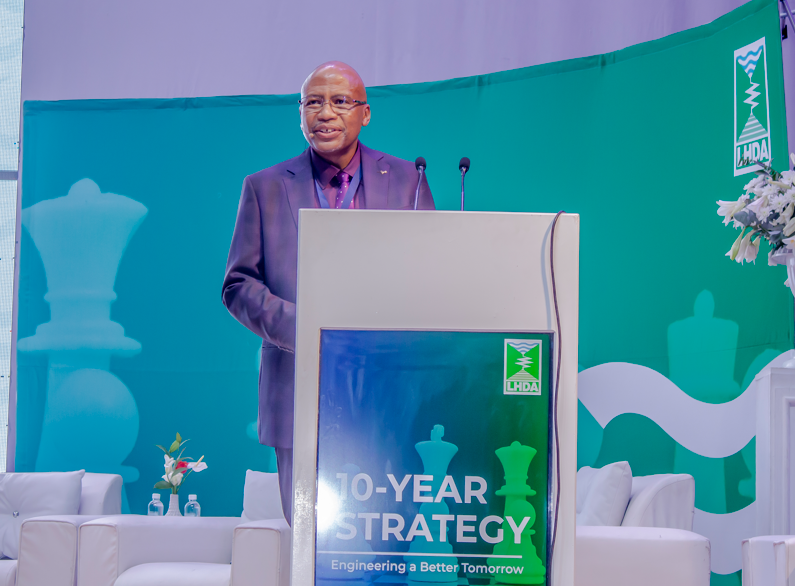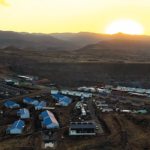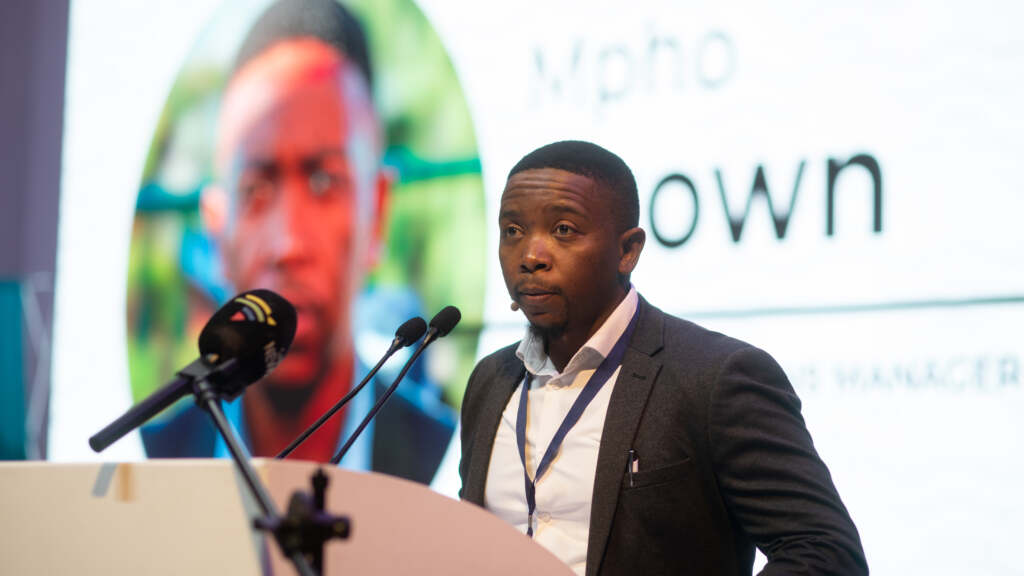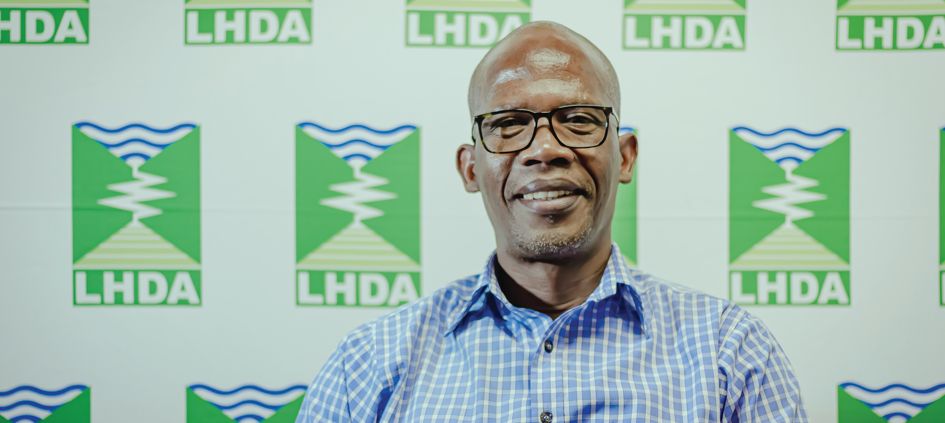The Constitution of Lesotho, despite being the supreme law of the land, does not apply to the Lesotho Highlands Water Project (LHWP) Treaty of 1986, according to Tente Tente, Chief Executive of the Lesotho Highlands Development Authority (LHDA).
Tente further asserted that the Water Act and the Environment Act are also inapplicable to the LHDA, a statutory body established to manage the portion of the LHWP within Lesotho’s borders.
The LHDA is responsible for the construction, operation, and maintenance of dams, tunnels, power stations, and associated infrastructure, as well as secondary developments such as relocation, resettlement, compensation, village water supply, irrigation, fish hatcheries, and tourism.
He made these statements in an answering affidavit in opposition to a lawsuit filed by the local human rights group, Equal Rights and Justice, together with activist and lawyer Lemohang Nsuzi.
The applicants approached the High Court in February this year, seeking an order compelling the governments of Lesotho and South Africa, the LHDA, the Lesotho Water Commission, and others, to amend, or facilitate the amendment of, the LHWP Treaty and its annexures.
They argue that the Treaty should be revised to reflect the principles of equitable and reasonable utilisation and sustainable development of the LHWP river system. They also want both countries to adhere to internationally recognized water governance frameworks, including the Helsinki Rules (1966), the Berlin Rules (2004), the UN Convention on the Non-Navigational Uses of International Watercourses (1997), and the Revised SADC Protocol on Shared Watercourse Systems (2000).
The applicants further call for the harmonisation of the Treaty with Lesotho’s domestic legal framework, specifically aligning it with Sections 5, 6, and 13 of the Lesotho Water Act, as well as the Environment Act.
Alternatively, they seek a declaration that the LHWP Treaty is unconstitutional for fostering a discriminatory legal regime, which they claim is expressly prohibited under Section 18 of the Constitution.
“Applicants seek a declaration that Articles 5 and 18 of the Lesotho Highlands Water Project Treaty violate the Constitution of Lesotho. Their argument is that by subjecting national law to the LHWP Treaty, these Articles infringe on Section 2 of the Constitution, which declares the Constitution as the supreme law of the land,” Tente stated.
“In other words, they argue that the Treaty should be subject to the Constitution, not the other way around,” he added.
Tente said he was advised, and believes it to be correct, that this argument collapses when considered against Lesotho’s theoretical approach to the relationship between international and national law.
Lesotho, he explained, adheres to the dualist approach, which views the national and international legal systems as distinct and separate. Under this doctrine, international law cannot become effective within a national legal system unless it is expressly incorporated, and national law cannot override international legal obligations.
“Generally, a state may not invoke its own national law, as the applicants have attempted to do, as a basis for repudiating an international legal obligation,” he said.
Citing legal advice, Tente referenced a principle of international law expounded by the Permanent Court of International Justice, which held: “It is a generally accepted principle of international law that in the relations between contracting parties to a treaty, the provisions of municipal law cannot prevail over those of the treaty.”
Tente also referred to Section 35 of Order No. 23 of 1986, which exempts the application of the Water Resources Act No. 22 of 1978 (later replaced by the Water Act of 2008) and the Electricity Act No. 7 of 1969 from the operations of the LHDA.
This, he argued, means these laws do not apply to the LHDA. “These Acts are not enforceable against the LHDA because they are expressly excluded from the Treaty framework. The applicants’ case rests on the enforcement of the Water Act and possibly the Environment Act No. 10 of 2008—neither of which has been incorporated into the Treaty.”
Due to this exemption, Tente noted, Sections 36 to 44 of Order 23 of 1986 establish a separate legal regime applicable to the LHDA in place of the Water Act.
“We will endeavour to highlight the crucial elements of this litigation, which cannot proceed without being thoroughly addressed in affidavits. Each of these key issues will be discussed seriatim,” he said.
LHWP is a multi-phased project to provide water to the Gauteng region of South Africa and to generate hydroelectricity for Lesotho.
It was established by the 1986 Treaty signed by the governments of Lesotho and South Africa.
The project entails harnessing the waters of the Senqu/Orange River in the Lesotho highlands through the construction of a series of dams for the mutual benefit of the two countries. Phase I of the project was completed in 2003 and inaugurated in 2004, and Phase II is currently underway.
Tente also sharply questioned the standing of the applicants, particularly the organisation Equal Rights and Justice – 1st Applicant.
“At this stage, it may prove necessary to interrogate the standing of the legal practitioner to seek the necessary reliefs and by extension whether a voluntary organisation equally has the standing to impugn a bilateral treaty between two states,” he said.
He further contended that Equal Rights and Justice was non-compliant with both the Societies Act and Societies Rules, and as such, should not enjoy standing before the courts due to its failure to meet legal requirements.
“I have been advised and believe the same to be true that when once it is illustrated that the 1st Applicant is non-compliant as we shall endeavour to illustrate in the succeeding paragraphs, the court shall be urged to accord it no audience to be heard as it has come to court with unclean hands,” he submitted.
He stressed that a voluntary organisation that does not meet its legal obligations cannot expect protection or a hearing in a court of law.
“The following point is worth highlighting in order to illustrate that the 1st Applicant is non-compliant with Societies Act read with Societies Rules and worth mentioning: There is no evidence before the Registrar General of Societies pointing to the fact that the 1st Applicant has ever rendered its returns within six months from the expiration of its financial year since its formation in tandem with Regulation 9 of the Societies Rules Government Notice No. 75 of 1967,” Tente asserted.
“The 1st Applicant is challenged to present this evidence and absent this evidence, the court is urged to dismiss its claim. The long-standing principle of ‘coming to court with unclean hands’ – this principle is the fulcrum of the rule of law and aims to give a court of law the discretion to give no remedy to a party/litigant who is in breach of the law irrespective of whether it is a criminal or civil litigation,” he added.
Summary
- The Constitution of Lesotho, despite being the supreme law of the land, does not apply to the Lesotho Highlands Water Project (LHWP) Treaty of 1986, according to Tente Tente, Chief Executive of the Lesotho Highlands Development Authority (LHDA).
- The applicants approached the High Court in February this year, seeking an order compelling the governments of Lesotho and South Africa, the LHDA, the Lesotho Water Commission, and others, to amend, or facilitate the amendment of, the LHWP Treaty and its annexures.
- Their argument is that by subjecting national law to the LHWP Treaty, these Articles infringe on Section 2 of the Constitution, which declares the Constitution as the supreme law of the land,” Tente stated.

Ntsoaki Motaung is an award-winning health journalist from Lesotho, specializing in community health stories with a focus on sexual and reproductive health and rights, as well as HIV. She has contributed to platforms like “Be in the KNOW,” highlighting issues such as the exclusion of people with disabilities from HIV prevention efforts in Lesotho.
In addition to her journalism, Ntsoaki serves as the Country Coordinator for the Regional Media Action Plan Support Network (REMAPSEN). She is also a 2023 CPHIA Journalism Fellow.









